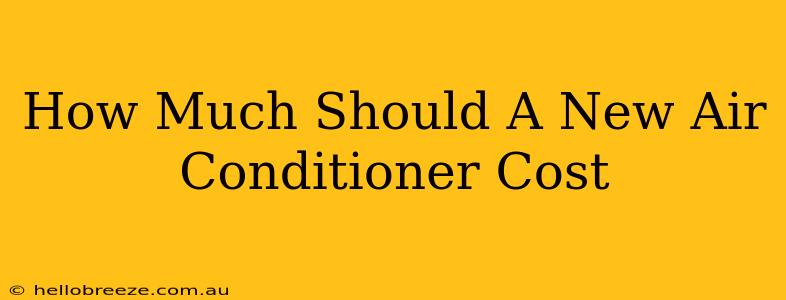Buying a new air conditioner is a significant investment, and understanding the cost is crucial before you start shopping. Prices vary wildly depending on several factors, so knowing what to expect can save you time, money, and headaches. This guide breaks down the factors influencing AC costs and helps you determine a reasonable price range for your needs.
Factors Affecting Air Conditioner Costs
Several key factors contribute to the overall cost of a new air conditioner:
1. Type of Air Conditioner:
- Central Air Conditioners: These systems are the most expensive upfront, typically ranging from $5,000 to $15,000 or more, depending on the size of your home and the features included. Installation is also a significant part of the cost.
- Window Air Conditioners: These are the most budget-friendly option, usually costing between $100 and $500. However, they are less efficient and only cool a single room.
- Portable Air Conditioners: Falling between window and central units, portable ACs generally cost between $300 and $1000. They offer more portability than window units but less cooling power than central systems.
- Ductless Mini-Split Systems: These are a popular choice for additions or rooms without ductwork, costing between $1,000 and $4,000 per unit, with installation adding to the total cost.
2. Size and SEER Rating:
The size (BTU rating) of your AC unit needs to match your home's square footage and insulation. An improperly sized unit can be inefficient and expensive to run. A higher SEER (Seasonal Energy Efficiency Ratio) rating means greater energy efficiency, leading to lower operating costs over the life of the unit. Higher SEER ratings usually mean a higher initial purchase price.
3. Features and Brands:
Modern air conditioners offer a range of features, such as smart home integration, advanced filtration systems, and quiet operation. These features increase the cost. Brand reputation also plays a role; well-known brands often command higher prices.
4. Installation Costs:
Installation costs can significantly add to the total price. Factors influencing installation costs include:
- Accessibility: Difficult-to-reach locations or existing ductwork configurations can increase labor costs.
- Additional materials: If new ductwork, wiring, or refrigerant lines are needed, the costs will rise.
- Permits: Local permits are often required for AC installation.
5. Professional vs. DIY:
While some window and portable units can be installed by homeowners, professional installation is strongly recommended for central and ductless systems. Professional installers ensure proper sizing, safe installation, and warranty coverage. Attempting DIY installation on complex systems can void warranties and pose safety risks.
Estimating Your Air Conditioner Costs
To estimate the cost of a new air conditioner, consider the factors mentioned above. Start by determining the type of AC you need and its required BTU rating. Then, research prices from different brands and retailers. Get multiple quotes from reputable HVAC contractors for professional installation. Don't forget to factor in potential additional costs like permits and materials.
Saving Money on Your New AC
- Look for rebates and incentives: Many utility companies and government programs offer rebates on energy-efficient AC units.
- Shop around and compare prices: Don't settle for the first quote you receive.
- Consider financing options: Some retailers offer financing plans to make the purchase more manageable.
- Maintain your AC: Regular maintenance can extend the lifespan of your AC and reduce repair costs.
Buying a new air conditioner is a substantial investment, but understanding the cost factors and planning ahead can help you make an informed decision and choose the right system for your needs and budget. Remember that the lowest price isn't always the best value; consider the long-term cost of operation and energy efficiency.

